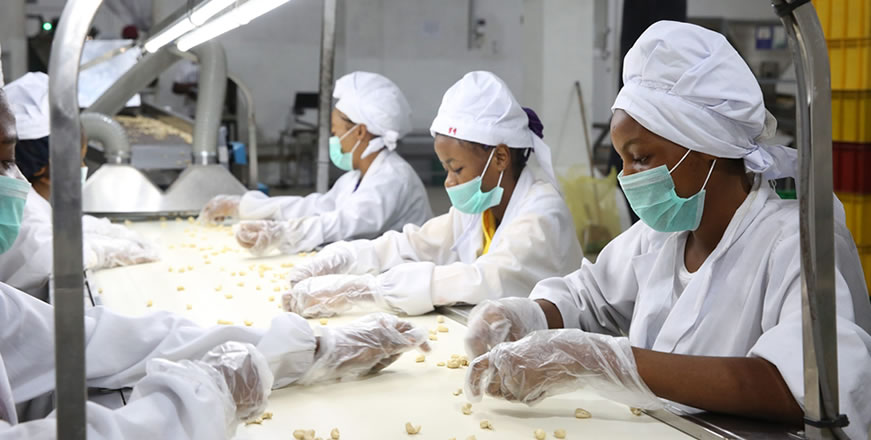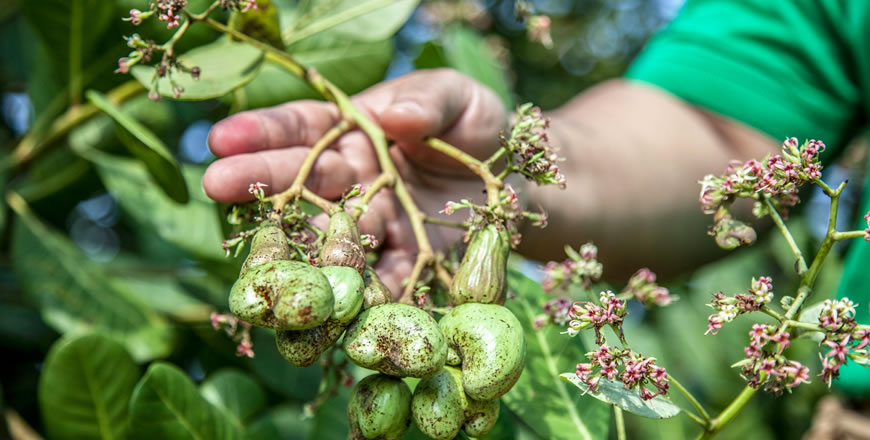
Enhancing Procurement and Traceability in the Cashew Processing Sector- Sonata
The global cashew industry, valued at approximately USD 8.78 billion in 2024 and projected to reach USD 10.98 billion by 2029, plays a vital role in the economies of many developing countries, particularly in Africa and Asia [mordor intelligence]. However, the sector faces significant challenges in procurement and traceability, impacting both efficiency and sustainability. Sonata, a BRC-certified premium cashew processing company operating in West Africa, has been recognized for its excellence in supply chain management and adherence to local government standards and regulations. This article explores the typical procurement issues in the cashew processing sector, current supply chain trends, and the role of digital technology in enhancing traceability, with a focus on Sonata’s innovative practices.
Procurement Challenges in the Cashew Processing Sector
The cashew processing industry encounters several procurement-related challenges.
Fragmented supply chains are a common issue, as the industry relies on numerous smallholder farmers, making coordination and standardization difficult [sustainable nut initiative]. This fragmentation is further compounded by quality variability, with inconsistent agricultural practices leading to disparities in the quality of raw cashew nuts. This inconsistency affects the marketability of the final product, creating additional obstacles for processors.
A lack of traceability is another significant problem, as limited transparency in sourcing makes it challenging to trace products back to their origin. This raises serious concerns about food safety and ethical sourcing, issues that are becoming increasingly important to consumers and regulators. Additionally, the industry faces financial instability due to price volatility in the market for raw cashew nuts, which poses risks for both processors and farmers.
Sonata’s Approach to Addressing Procurement Challenges
Sonata Agric International has implemented a range of strategies to address these procurement challenges effectively. The company works directly with thousands of farmers, promoting good agricultural practices and ensuring a consistent supply of high-quality raw cashew nuts. This direct engagement not only improves product quality but also strengthens long-term relationships with suppliers. By adopting fair pricing models, Sonata supports farmers with equitable earnings, fostering a sense of partnership and stability within the supply chain. To address the issue of traceability, Sonata has invested in innovative technology, including a cloud-based platform that tracks each cashew nut back to its origin farm. This system enhances transparency and accountability, aligning with Sonata’s commitment to responsible sourcing and sustainability.
Supply Chain Trends in the Cashew Processing Industry
In recent years, the cashew processing industry has undergone several significant transformations. There is a growing trend toward processing cashews closer to their origin, which not only adds value locally but also reduces reliance on the export of raw nuts [African cash alliance]. This shift is particularly beneficial for local economies, creating jobs and retaining more value within producing regions. The industry is also increasingly focused on sustainability, driven by consumer demand for ethically sourced products and regulatory pressures to adopt environmentally friendly practices. The integration of digital technology has emerged as a game-changer, enabling companies to streamline operations, improve efficiency, and enhance traceability. Additionally, rising global demand for cashew products has encouraged producers to explore new markets and diversify their product offerings to cater to a broader audience.
Sonata’s Alignment with Industry Trends
Sonata Agric International is at the forefront of these industry trends. By establishing processing facilities in Nigeria and Côte d’Ivoire, Sonata is committed to local processing, handling over 30,000 tons of raw cashew nuts annually. This not only supports regional economies but also helps reduce the carbon footprint associated with transporting raw materials to distant processing facilities. The company’s dedication to sustainability is evident in its efforts to employ over 70% women in its workforce, ensuring gender inclusivity and promoting community development. Sonata’s use of a tech-enabled traceability system further exemplifies the industry’s move toward digital transformation, demonstrating its forward-thinking approach to supply chain management.
The Role of Digital Technology in Enhancing Traceability
Digital technology offers immense potential to improve traceability in the cashew supply chain. Innovations like blockchain technology can create immutable records of transactions, fostering transparency and trust among stakeholders. The use of Internet of Things (IoT) devices enables real-time monitoring of the condition and location of goods, ensuring better control throughout the supply chain. Advanced data analytics tools can predict demand, optimise inventory, and identify potential disruptions, enhancing overall supply chain resilience. These technologies are transforming the way the cashew industry operates, making it more efficient, transparent, and sustainable.
Sonata’s Digital Innovations
Sonata Agri International has embraced these digital innovations to strengthen its operations and address industry challenges. The company’s cloud-based traceability platform not only tracks the journey of cashews from farm to consumer but also provides valuable data insights that help optimise the supply chain. By engaging with farmers through digital platforms, Sonata promotes better agricultural practices and enhances productivity, further strengthening its position as a leader in the cashew processing sector
Conclusion
The cashew processing sector faces complex procurement and traceability challenges, but companies like Sonata are proving that these issues can be overcome through innovation and commitment. By addressing procurement challenges head-on, aligning with key industry trends, and leveraging the power of digital technology, Sonata is setting a benchmark for excellence in supply chain management. Its efforts not only enhance operational efficiency but also contribute to the sustainability and transparency of the global cashew supply chain. In doing so, Sonata continues to lead the way toward a more sustainable and ethical future for the cashew processing industry.






